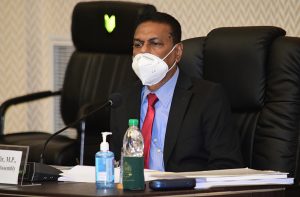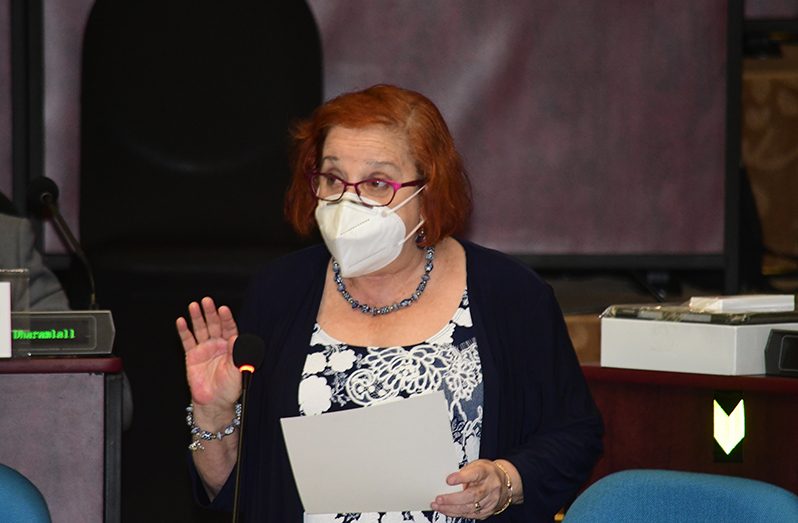By Navendra Seoraj
IT was “smooth sailing” during the first sitting of the National Assembly, as the absence of the political opposition made for an “easy passage” of the proposed $11.2 billion budget for 16 constitutional agencies.
In what some persons called a historic move, Minister of Parliamentary Affairs and Governance, Gail Teixeira, tabled a motion to suspend Standing Order 71(2), in order to continue and conclude the consideration of the current and capital budgets of the constitutional agencies, for the year 2020.
Minister Teixeira, in her motion, said there were no changes to the requests made by the constitutional agencies, so it would be wise to move quickly through the issue so that they would not have to meet again to consider the estimates.
Her motion was unopposed, so newly-elected Speaker of the House, Manzoor Nadir, resolved the House to the Committee of Supply in order to consider the estimates for the constitutional agencies.

To further expedite the process, Minister of Public Infrastructure, Juan Edghill, proposed that since there is no opposition or amendments to the estimates, it should be approved unamended.
The process ended ‘quietly’ with the approval of $11.2 billion for those agencies, which will now be financially equipped to effectively execute their mandates for the rest of the year.
The approved budget for constitutional agencies, includes $4,943,052,000 for the Guyana Elections Commission (GECOM); $1,799,248,000 for Parliament Office; $908,636,000 for the Audit Office of Guyana; $150,636,000 for the Public and Police Service Commission; $117,075,000 for the Teaching Service Commission; and $2,443,164,000 for the Supreme Court.
The proposal also includes $229,412,000 for the Chamber of the Director of Public Prosecution; $70,001,000 for the Office of the Ombudsman; $40,911,000 for the Public Service Appellate Tribunal; $220,802,000 for the Ethnic Relations Commission; and $10,020,000 for the Judicial Service Commission.
Government will also be seeking approval of $24,392,000 for the Indigenous People’s Commission; $25,958,000 for the Human Rights Commission; $46,095,000 for the Rights of the Child Commission; $49,945,000 for the Women and Gender Equality Commission; and $206,460,000 for the Public
Procurement Commission.
With this out of the way, the new focus will be on the passage of the National Budget, which is expected to be tabled in the coming week.
The country’s last budget, Budget 2019, was passed in December 2018 to the tune $300.7B. And, with the country already nine months into 2020, it is important for a budget to be passed soon.
PROTRACTED ELECTORAL PROCESS
As customary, the National Assembly would have been in recess, but because of a protracted electoral process, which concluded in August, parliamentarians are forced to meet in order to deliberate on critical parliamentary matters, including the presentation and consideration of the 2020 estimates.
The need for a budget is even more critical at this time because the country is faced with the dire direct and indirect effects of the novel coronavirus (COVID-19) pandemic. The pandemic not only poses medical challenges, but it has also changed the usual way of life, and this is evidenced by the numerous measures employed to promote social distancing and constant sanitisation.
Even the illustrious Parliament Building was not used as sittings have been shifted to the Arthur Chung Convention Centre, for now.
In keeping with the COVID-19 control measures and the urgency to conclude the work of the National Assembly, Minister Teixeira tabled a motion to have the time for sittings adjusted to 10:00 hours – 20:00 hours. This motion was unopposed.
The time was adjusted in anticipation of the potential budget debates and consideration of estimates.
It was reported recently that Guyana has been without a budget for over a year and the extraordinary spending that occurred between March 2 and August
2 has left the treasury in an empty state, President Irfaan Ali had said.
According to him, the mismanagement of many State institutions and decision-making processes of Guyana resulted in the tremendous loss of finances, compared to pre-2015.
“We are going to ensure that we do a comprehensive report on every aspect of the economy, every sector, so that the Guyanese population can understand what is taking place,” the President told Newsroom in a recent interview.
The budget to be laid in the National Assembly will focus on making resources available to tackle a number of pressing issues.
“The first few weeks have been used for bringing together the pieces to have a full assessment of the situation, and developing strategies in the emergency budget to address the immediate concerns and needs, as we move towards the planning of a full budget next year,” he said.
He also noted that Vice-President (VP), Dr. Bharrat Jagdeo, will be reading the budget in Parliament, as government continues search for a minister of finance.












